
Disqualified!
![]()

![]()

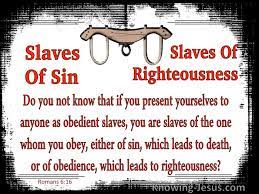 Yesterday a young Christian with whom I was working said to me, "I do not like to be told that I cannot do something that I enjoy doing because it is going to offend the conscience of someone else. That sounds like legalism to me." I agreed, because I do not like to be told that either. I do not like to stop doing something that I enjoy doing because it offends someone else, or because it is a stumbling block to them. But I realize that the thing in me that does not like that is what the Scriptures call my "flesh." I do not like to deny myself anything; I like to do what I feel like doing.
Yesterday a young Christian with whom I was working said to me, "I do not like to be told that I cannot do something that I enjoy doing because it is going to offend the conscience of someone else. That sounds like legalism to me." I agreed, because I do not like to be told that either. I do not like to stop doing something that I enjoy doing because it offends someone else, or because it is a stumbling block to them. But I realize that the thing in me that does not like that is what the Scriptures call my "flesh." I do not like to deny myself anything; I like to do what I feel like doing.Do you not know that in a race all the runners compete, but only one receives the prize? So run that you may obtain in it. Every athlete exercises self-control in all things. They do it to receive a perishable wreath, but we an imperishable. Well, I do not run aimlessly, I do not box as one beating the air; but I pommel my body and subdue it, lest after preaching to others I myself should be disqualified. (1 Corinthians 9:24-27 RSV)All this is built around the figure of an athletic contest -- a race. This was a familiar thing to these believers in Corinth. Every three years the Isthmian Games (very much like the Olympic Games we are familiar with, which were also held in Greece), were held right outside the city. If you go to Corinth you can still see the areas where the races were run. The starting blocks where the athletes started out the races are still embedded in the stones. Paul is using this figure, because, to him, life is a race like that.
People who really want something always give some evidence of that fact. People who really desire something with the whole of their being do not sit down passively waiting for it to come. And that applies to us in this matter. There are certain things in this life that are patently opposed to God and his righteousness. There is no question about that at all. We know they are bad; we know they are harmful; we know they are sinful. I say that to hunger and thirst after righteousness means avoiding such things just as we would avoid the very plague itself. If we know there is an infection in a house, we avoid the house. We segregate the patient who has a fever because it is infectious, and obviously we avoid such persons. The same is true in the spiritual realm. But it does not stop at that. I suggest that if we are truly hungering and thirsting after righteousness, we shall even avoid things that tend to dull or take the edge off our spiritual appetites. There are so many things like that, things that are quite harmless in themselves and which are perfectly legitimate. Yet if you find that you are spending too much of your time with them and that you desire the things of God less, you must avoid them. That is a common sense argument.That, basically, is what Paul is saying. He is saying in his own life he did that. He limited his indulgences. He refused to give way to intemperance or to be lazy. He gave himself to what God wanted him to do. He worked at it and took time in planning in order to accomplish it.
 Here at Corinth they were going in for the dependence, the indulgence angle of things, letting God do it all. But Paul says, "You will never win that way. If you are not willing to give up some things and to press toward the mark, to focus your life on a single objective, you will never win. You will find yourself ultimately disqualified." There is that word. Paul says, "It can happen to me. I preach all this to others, and if I just preach it, it shows I understand it, but if I do not do it I too can end up disqualified."
Here at Corinth they were going in for the dependence, the indulgence angle of things, letting God do it all. But Paul says, "You will never win that way. If you are not willing to give up some things and to press toward the mark, to focus your life on a single objective, you will never win. You will find yourself ultimately disqualified." There is that word. Paul says, "It can happen to me. I preach all this to others, and if I just preach it, it shows I understand it, but if I do not do it I too can end up disqualified."What a remarkable example! Notice the repetition through that account of the word all. When they came out of Egypt all the Israelites were enjoying tremendous blessing from God, advantages they all had without exception, the weakest of them, the youngest of them, the oldest of them, the feeblest among them. Paul lists the advantages for us. First, they were "all under the cloud, and all passed through the sea." Now this "cloud" is a reference to the Shekinah cloud, the glory that hovered over the camp of Israel, shining by day to guide them, and becoming a pillar of fire at night. It is a symbol of the protection of God of his people and the guidance that he gives them. The "sea," of course, is the Red Sea that they passed through safely and thus left the bondage and curse of Egypt, so that these are a picture of the protecting, the guiding, and the delivering power of God that they all had experienced.I want you to know, brethren, that our fathers were all under the cloud, and all passed through the sea, and all were baptized into Moses in the cloud and in the sea, and all ate the same supernatural food and all drank the same supernatural drink. For they drank from the supernatural Rock which followed them, and the Rock was Christ. Nevertheless with most of them God was not pleased; for they were overthrown in the wilderness. (1 Corinthians 10:1-5 RSV)
Now you see the parallel: Every Christian is in this same position. We have all been delivered, if we are Christians at all. We have been transferred, translated from the kingdom of darkness to the kingdom of light. We are now part of a new spiritual realm, Paul says. Furthermore, we are protected. God is always watching over us and guarding us. We are guided. We have all experienced at times the guidance of God as he leads us into places he wants us to be. So we all share that, like those of old.
Then the second thing Paul says of them is they "all were baptized into Moses in the cloud and in the sea." What does that mean? That is a strange phrase, "baptized into Moses," but it is a parallel to what it says of us, that we are baptized into Christ. Just as we have been placed into Christ and identified with him, so these Israelites of old were identified with Moses. Now Moses was the great mediator of the Old Testament. He stood between God and man; he was the representative of the people to God, and the spokesman of God to the people. He had intimate access to God, and in Moses these people all had that same access to God. This, of course, is true of us, is it not? Paul argues this in Romans 5, where he says, "Through him we have obtained access to this grace in which we stand," (Romans 5:2a RSV).
The third advantage they had was that they were all strengthened and refreshed by Christ, for "all ate the same supernatural food and all drank the same supernatural drink." The food, of course, was the manna that came from heaven, and the drink was the water that flowed from the rock when Moses smote it. The Rock which followed them, Paul says, was Christ. Now do not ever say that the Old Testament saints knew nothing of Christ, because they did. They saw him in all these symbols and figures that were used in the Old Testament times. They were related to him as we are related to him, and just as he fed them and refreshed them, so we are fed and refreshed by the Spirit of God flowing out of Christ. When it says the Rock "followed them," do not imagine a great big rock rolling along behind the camp. It is not that. It means wherever the symbol of a Rock appears in the Old Testament, and it does frequently, it was a reference to and a picture of Christ. The Rock from which the water flowed, the Rock of refuge into which they ran when the summer storms broke upon the landscape, these were references to Christ. Samuel erected a rock, a "stone," he called it Ebenezer, "the stone of help," -- that was a reference to the help that Christ was giving them at that time. Therefore we are in the same boat. Yet, with all this opportunity and advantage, the amazing thing is that God was not pleased with most of them.
Is that not sobering? How many left Egypt? According to the record of Numbers, over 600,000 men alone, counting women and children makes that almost 2,000,000 people. Of those 2,000,000 how many entered into the land? Two men: Caleb and Joshua. They were the only ones; the rest all died in the wilderness, disqualified, no longer able to serve and function in the way God intended them to do because, as Paul describes in Verse 6,
...these things are a warning for us, not to desire evil as they did. (1 Corinthians 10:6 RSV)Do you know that is happening to people today? A young man told me last week of a girlfriend he has who is a Christian, and when they are together he said he does not know what to do because she keeps urging him to indulge in immorality with her. He says to her, "But you are a Christian; you can't do that." But she says, "Well, what is the difference? We can be forgiven afterwards. Why not?" Now, that is the very kind of subtle lie that leads people into activities for which they will be disqualified. This is what Paul feared, and what he faced. He goes on to give us four danger points to watch, and these are just as pertinent today as they were when they were written. Verse 7:
Do not be idolaters as some of them were; as it is written, "The people sat down to eat and drink and rose up to dance." (1 Corinthians 10:7 RSV)This was the scene at the foot of Mount Sinai when the Law was being given to Moses, who had gone up to commune with God. He was gone 40 days and 40 nights, and after a while the people got tired of waiting so they had a big feast. There is nothing wrong with that. But then somebody suggested they dance. There is nothing wrong with that either. Israel often danced before the Lord, and God is the God of the dance as well as other things. But in their dancing, in their indulgence, they got "carried away" we would say, and they began to dance in a way that was lascivious and lewd. Finally they found themselves bowing down and worshiping a golden calf which Aaron claimed came out of the fire when he threw in some gold. What a remarkable fire! They ended up in idolatry.
 Now that is what Paul is warning against -- the ease with which things can capture our attention and be so important to us that we feel we cannot live without them. That is idolatry. I am amazed at how many Christians worship their cars, or their children, or some sports figure, or some rock-and-roll artist, or some movie star. I am amazed at how many Christians worship the United States and bow down to it. Their main purpose of life is to indulge in some political activity. All these things are right, but they become idols when they take on supreme significance to us. That is a way to be disqualified. Then there is fornication, Verse 8:
Now that is what Paul is warning against -- the ease with which things can capture our attention and be so important to us that we feel we cannot live without them. That is idolatry. I am amazed at how many Christians worship their cars, or their children, or some sports figure, or some rock-and-roll artist, or some movie star. I am amazed at how many Christians worship the United States and bow down to it. Their main purpose of life is to indulge in some political activity. All these things are right, but they become idols when they take on supreme significance to us. That is a way to be disqualified. Then there is fornication, Verse 8:
We must not indulge in immorality as some of them did, and twenty-three thousand fell in a single day. (1 Corinthians 10:8 RSV)That is referring to the account in Numbers 25 when some of the Israelites objected to God's leading, and the women of Moab and Midian came and tempted them, and they fell into fornication with them. A plague broke out in the camp which was not arrested until Phinehas, the grandson of Aaron, took a spear and actually speared to death a couple engaged in fornication.
We must not put the Lord to the test, as some of them did and were destroyed by serpents. (1 Corinthians 10:9 RSV)This refers to the story in Numbers 21 of how they presumed to charge God with unfaithfulness. They said, "You brought us out of Egypt, and we are going to die in this wilderness. It is your fault. Why did you bring us out of Egypt?" Did you ever say anything like that to God? "What did you put me here for? It is your fault I got into this." Now that is "putting God to the test," and it is a dangerous thing to do because, continued, it can lead to disqualification. So the serpents came among them and were arrested, you remember, only by the lifting up of a brazen serpent on the pole. Then the fourth danger point is murmuring, grumbling,
...nor grumble, as some of them did and were destroyed by the Destroyer. (1 Corinthians 10:10 RSV)That is the story of Korah, Dathan, and Abiram, those three young men who began to grumble at the authority that Moses had. They said, "We are just as good as Moses. Why don't we exercise the same kind of authority he does? He doesn't have anything over us." They began to create revolt and spread unrest in the camp of Israel, and God called them to task and said he would show them which one he had chosen. The ground opened up under Korah, Dathan, and Abiram and swallowed them up. They were gone, destroyed by the Destroyer. Now that is sobering, is it not? Paul's admonition to us, in Verse 11, is:
Now these things happened to them as a warning, [literally, "as a type"] but they were written down for our instruction, upon whom the end of the ages has come. [We are the terminal age of history.] Therefore let any one who thinks that he stands take heed lest he fall. (1 Corinthians 10:11-12 RSV)These things are given in the Old Testament as types, pictures. That is, when you read these Old Testament stories, put yourself there. The enemies that they faced are answered by the enemies that we face, the principalities and powers of darkness that are seeking to overcome us, assault us, discourage us and defeat us, just as Israel was defeated and discouraged. When you see how they trusted in God, held on to his promises, renewed their strength by faith, and then set about to diligently do what God set them to do, that is the picture for us of how to overcome in the struggles and the battles that we face in life.
No temptation has overtaken you that is not common to man. God is faithful, and he will not let you be tempted beyond your strength, but with the temptation will also provide the way of escape, that you may be able to endure it. (1 Corinthians 10:13 RSV)
 Oh what an encouragement that is! That is written down that we might understand three specific things about our testings: First, they are common to all. I do not know anything that is harder to believe, when you are under testing, than that. We all think, "Why doesn't this happen to them? They deserve it so much more than me. Why is it happening to me?" Well, it is just your turn, that is all. Everybody goes through it. You are not permitted to witness their martyrdom, but you will not be allowed to miss yours. You do not see what they go through most of the time, but no one is left out. Trials are common to all. Their time is coming, if it has not already, so do not ever allow yourself to think that what is happening to you is unique. It is not at all. It is very common, and the minute you start inquiring around, you will find a dozen that have gone through it too.
Oh what an encouragement that is! That is written down that we might understand three specific things about our testings: First, they are common to all. I do not know anything that is harder to believe, when you are under testing, than that. We all think, "Why doesn't this happen to them? They deserve it so much more than me. Why is it happening to me?" Well, it is just your turn, that is all. Everybody goes through it. You are not permitted to witness their martyrdom, but you will not be allowed to miss yours. You do not see what they go through most of the time, but no one is left out. Trials are common to all. Their time is coming, if it has not already, so do not ever allow yourself to think that what is happening to you is unique. It is not at all. It is very common, and the minute you start inquiring around, you will find a dozen that have gone through it too.
Common trials, but also controlled pressures -- God is faithful, he will not allow you to be tempted above your strength. Again, that is hard to believe, is it not? We say, "Well, it has already happened. I am already beyond my strength." No, you are not. You just think you are. God knows your strength greater than you do. He knows how much you can handle, and how much you cannot. One of the basic principles of training in an athletic contest is to develop you to do things you do not think you can do right now, to put more pressure on you than you think you can handle, is it not? And you discover you can handle it. This is what God does with us. He puts the pressure on, but it is controlled pressure. It will never be more than you can handle, if you observe the third thing, the conquering grace that he provides, "the way of escape" that is always present, never failing. What is that way of escape? Well, it is what we have been talking about -- dependence. Discipline is necessary, but so is dependence. All through the Old Testament the heroes and heroines of faith have taught us that in the hour of testing God strips away all human support in order that we may learn that he is enough. God is our refuge and our strength, a very present help in time of trouble, and we will never discover that until everything else has been taken away. Then we begin to discover that God can hold us steady. He himself is the way of escape, and that is why he puts us through pressures and testings.
Let us stand and we will read together the hymn, We Are Living, We Are Dwelling. Let this great poem from the past be our closing prayer and admonition.
![]()
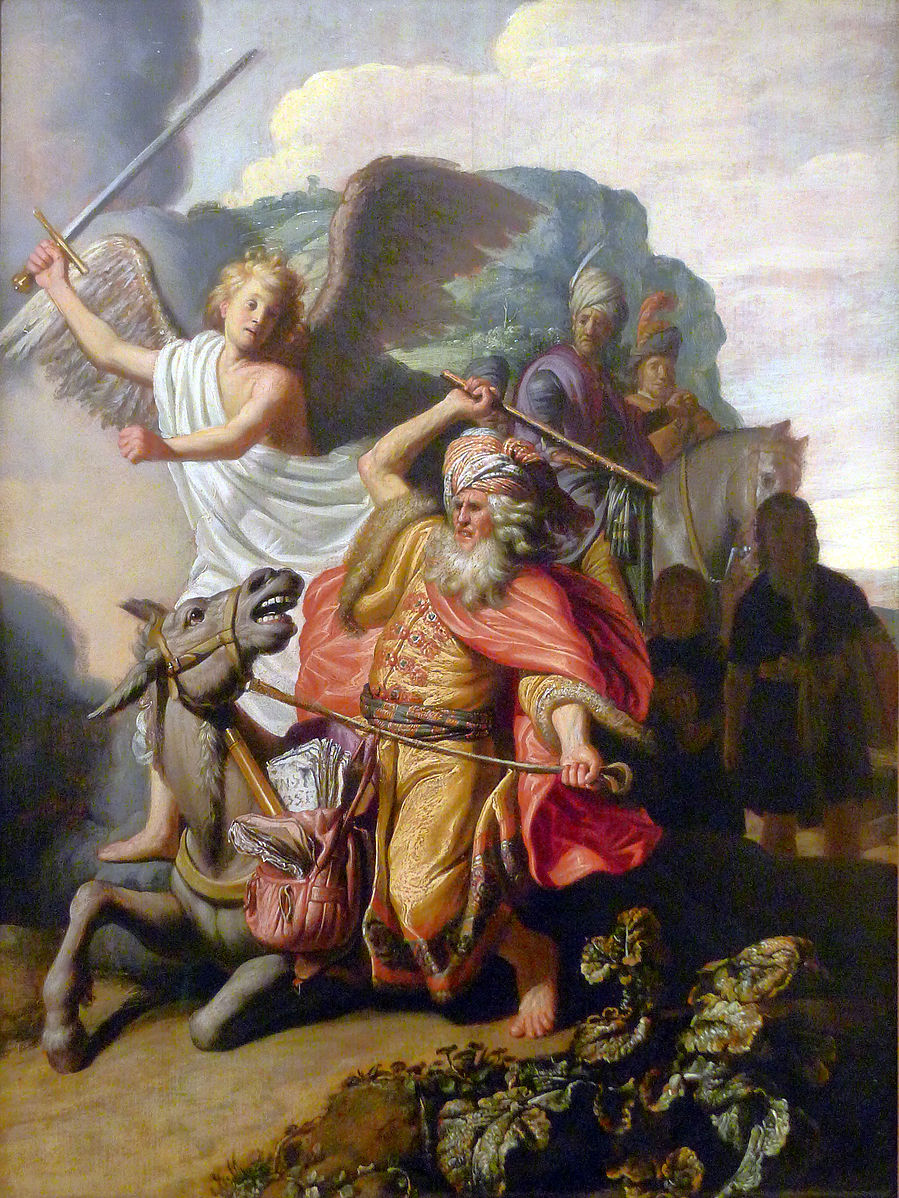
Revelation Chapters 2 and 3 record Seven Letters to the Church from Jesus Christ the Lord of the Church. Especially relevant for this discussion is the letter to Pergamum:
"To the angel of the church in Pergamum write:
"These are the words of him who has the sharp, double-edged sword. I know where you live -- where Satan has his throne. Yet you remain true to my name. You did not renounce your faith in me, even in the days of Antipas, my faithful witness, who was put to death in your city -- where Satan lives.
"Nevertheless, I have a few things against you: You have people there who hold to the teaching of Balaam, who taught Balak to entice the Israelites to sin by eating food sacrificed to idols and by committing sexual immorality. Likewise you also have those who hold to the teaching of the Nicolaitans. Repent therefore! Otherwise, I will soon come to you and will fight against them with the sword of my mouth." (Revelation 2:12-16 NIV)
This church is in sharp contrast to the church at Smyrna. Smyrna was enduring persecution; this church was faced with enticement and corruption. The devil has only two ways of approach. If he cannot make you knuckle under with hostility and persecution he will begin to entice you and lure you into something dangerous. It is either intimidation or enticement. It is either the violence of a roaring lion or the corruption of an angel of light. Pergamum is the church that is being undermined by corrupt practices and corrupt teaching.
Our Lord identifies himself to it as the one having "the sharp, doubled-edged sword." As we have already seen, that is the symbol of the Word of God coming from his lips. It is double-edged; it cuts two ways. I believe that refers to the fact that the Word can cleave the skull to get to the mind, and it can pierce the heart to touch the emotions. It can awaken us to reality. By the Word of God our minds begin to learn truth that we never saw before. We see things the way they are, and it motivates us to action. It can also pierce the heart. Remember that on the Day of Pentecost, when Peter had finished his message, the people were cut to the heart, according to the book of Acts. They cried, "Men and brethren, what must we do?" (Acts 2:37 KJV). That is the power of the Word. It touches both the reason and the conscience.
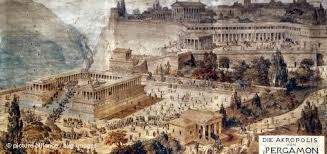 Pergamum was the Roman capital of the province of Asia. Located about 50 miles north of Smyrna. It was a center of pagan worship and there was a temple to Caesar there as well. It is called here, "where Satan has his throne," i.e. the place where Satan rules. And it is also referred to as the city "where Satan lives," i.e., where he has his headquarters. Many scholars think that refers to the great altar of Zeus which was on the hillside overlooking the city. It was a great chair, or throne, forty feet high, and any citizen could look up there at any time and see what Jesus calls "Satan's throne." This was such a center of pagan worship it seemed to be the very center of evil. There is a fascinating footnote of history in connection with this. In the 1880's, about 100 years ago, a German archaeologist working in the city of Pergamum removed that throne, that Satanic seat, from the hillside and took it to Europe. Today it is visible yet in the Pergamum Museum in the city -- get this -- of East Berlin! For 100 years Satan's throne has been in East Berlin. If that has any connection with the rise of Hitler, and the Nazis, I leave to you to judge. But East Berlin is also where Hitler's headquarters were located.
Pergamum was the Roman capital of the province of Asia. Located about 50 miles north of Smyrna. It was a center of pagan worship and there was a temple to Caesar there as well. It is called here, "where Satan has his throne," i.e. the place where Satan rules. And it is also referred to as the city "where Satan lives," i.e., where he has his headquarters. Many scholars think that refers to the great altar of Zeus which was on the hillside overlooking the city. It was a great chair, or throne, forty feet high, and any citizen could look up there at any time and see what Jesus calls "Satan's throne." This was such a center of pagan worship it seemed to be the very center of evil. There is a fascinating footnote of history in connection with this. In the 1880's, about 100 years ago, a German archaeologist working in the city of Pergamum removed that throne, that Satanic seat, from the hillside and took it to Europe. Today it is visible yet in the Pergamum Museum in the city -- get this -- of East Berlin! For 100 years Satan's throne has been in East Berlin. If that has any connection with the rise of Hitler, and the Nazis, I leave to you to judge. But East Berlin is also where Hitler's headquarters were located.
In his appraisal, our Lord assesses the strengths of this church: He says, first, "You remain true to my name." They had refused to budge on their view of his person. They held to the truth about Jesus. They saw him as the God-man, combining in one person two natures, both of God and man. That is orthodox doctrine. That is the teaching of the church from its very beginning, and clearly evident in the Scripture. Against all the corrupting influences around them, these people had held to that truth. Almost all heresies today flow out of a denial of the deity of Jesus. But we must not also deny the humanity of Jesus. He was God as though he had never been man, and man as though he was never God. Both are true. The church at Pergamum had held fast to that teaching. Second, they did this at the risk of their own lives. Jesus says, "You did not renounce your faith in me, even in the days of Antipas, my faithful witness, who was put to death in your city -- where Satan lives." Antipas means "against all." We do not know much about this man, although he is said to be the first martyr under the Roman persecution in Asia. Tradition says he was roasted to death in a brazen bull that was heated to a white heat. That is the price that he had to pay for being true to the doctrine about Jesus. He had to stand "against all!"
But two terrible errors were undermining this church: One is called here "the teaching of Balaam." You can read about it in Numbers 25. Balaam was a false prophet who had been hired by Balak, the King of Moab, to curse Israel, but when he tried to do so he found he could not. Every time he tried to curse them, words of blessing came out of his mouth. God would not let him curse his people. So, in order to achieve the end for which he had been hired, he paid beautiful maidens from Moab and Midian to parade before the young men of Israel, tempting them into sexual immorality. Since these women were worshipers of idols, by that means he introduced idol worship into the tribes of Israel. Thus he corrupted and enticed them into sin. The counterpart we face in our day is the practice of pornography and fornication among Christians and the acceptance of unmarriages, of living together without marriage, that is often widespread in the churches today. That is the error of Balaam.
They were also being seduced by the error of the Nicolaitans. Though it is difficult to know exactly who these people were, the name means "conquerors of the people." It appears they claimed to have a special relationship to God. They professed to be the beneficiaries of intimate revelations that were not given to others, and that they therefore had an inside track with God. They presumed to take the place of the priesthood in Judaism, and carried that error into the Christian church. Probably both of these false teachings worked together. One appealed to physical lust, and the other to the ambition for power exercised in a religious way. It is seen yet today in the supremacy of pastors who are lifted up above the laity. They are men who claim to have more intimate relationships with God, and thus are regarded as better than the rest of the people. The way you handle either error, of course, is with the sharp, two-edged sword! Jesus said, "Repent. Otherwise, I will come to you and fight against them with the sword of my mouth." The Word of God exposes both the error of immorality and the error of priestly superiority. That is one reason why the exposition of Scripture is resisted in many churches.
Prophetically, this is the period from the accession of Constantine in 320 A. D. to the rise of the papacy in the 6th century. During that period of time were held the great councils of the church. The council of Nicea, the council of Chalcedon and others, determined the true doctrine of the person of Christ -- who he was, and how he combined in himself the two natures. But it was also the time of the wedding of the church and the world under Constantine. (Incidentally, Pergamum means "marriage." It comes from the same root from which we get monogamy and bigamy). Constantine was not really a true Christian. He adopted many pagan practices and brought them into the church where they were accepted. Christianity was popular in those days, and many pagan practices were incorporated into it. This began when the church was viewed as a worldly kingdom, like any other kingdom. Our Lord's appeal is found in Verse 17:
"He who has an ear, let him hear what the Spirit says to the churches. To him who overcomes, I will give some of the hidden manna. I will also give him a white stone with a new name written on it, known only to him who receives it." (Revelation 2:17 NIV)
This is addressed to those who will take heed to the warnings of this letter, and watch in the areas of sexual immorality and of spiritual superiority. If you stand fast against immorality and the love of religious power you will be given the "hidden manna." Notice both the manna and the new name are secret things. It is a picture of close intimacy. Manna, of course, was the food that Moses fed the Israelites in the wilderness. Jesus said in Chapter 6 of John, "I am the bread sent down from heaven," (John 6:41). He is that hidden manna. He is food for the inner spirit, food that others do not know about. In John 4, our Lord sent his disciples into the city of Sychar to get food. When they came back and found he had been ministering to the woman at the well, he said, "I have had food that you know not of," (John 4:32). He was feeding upon the inner strength that God the Father was giving him. That is what is given to those who will resist the lure of immorality and spiritual privilege.
Then, with it, is the white stone with a secret name upon it. White stones were used among the Romans as a mark of special favor. A secret name, of course, is a sign of intimacy. Some years ago the well known Christian author, Elizabeth Elliott was speaking here at PBC. For a while I called her Betty Elliott because that was the name used in the book that she wrote about her husband Jim. One day she corrected me. She said, "You know, my name is not Betty, it is Elizabeth. Betty was Jim's private name for me." It was apparent to me that she wanted to preserve it as his name for her alone. So I began to call her Elizabeth instead of Betty. A secret name is a special mark of intimacy. If you know the Lord Jesus, and your heart is kept from the corrupting influences of the world around, you will enjoy an intimacy with him in which the new nature he has given you (depicted by the new name here), becomes stronger and more developed, and you enter into beautiful fellowship and intimacy with him. -- Ray Stedman, The Pressured Church.
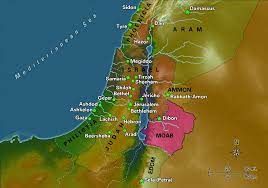 The map on the left shows that the territory of Moab, now part of Jordan, lies just South and East of Jericho where the Jews will soon enter the promised land at last, as described the Book of Joshua. First comes the Second Giving of the Law, Deuteronomy, and the death of Moses. Moab is located where Sodom and Gomorrah were located. These Canaanite cities were destroyed in the time of Abraham, about 500 years earlier. See The Meaning of Sodom and Gomorrah.
The map on the left shows that the territory of Moab, now part of Jordan, lies just South and East of Jericho where the Jews will soon enter the promised land at last, as described the Book of Joshua. First comes the Second Giving of the Law, Deuteronomy, and the death of Moses. Moab is located where Sodom and Gomorrah were located. These Canaanite cities were destroyed in the time of Abraham, about 500 years earlier. See The Meaning of Sodom and Gomorrah.
America has three main gods now, they are fallen angels, Canaanite deities. They are Baal, Ashteroth and Moloch. The worship of sex underlies all three.
Scientific Naturalism is our unofficial national religion these days! In philosophy, naturalism is the idea or belief that only natural laws and forces (as opposed to supernatural or spiritual ones) operate in the universe. Adherents of naturalism assert that natural laws are the only rules that govern the structure and behavior of the natural world, and that the changing universe is at every stage a product of these laws.
Naturalism is not so much a special system as a point of view or tendency common to a number of philosophical and religious systems; not so much a well-defined set of positive and negative doctrines as an attitude or spirit pervading and influencing many doctrines. As the name implies, this tendency consists essentially in looking upon nature as the one original and fundamental source of all that exists, and in attempting to explain everything in terms of nature. Either the limits of nature are also the limits of existing reality, or at least the first cause, if its existence is found necessary, has nothing to do with the working of natural agencies. All events, therefore, find their adequate explanation within nature itself. But, as the terms nature and natural are themselves used in more than one sense, the term naturalism is also far from having one fixed meaning. With the exception of pantheists--who believe that Nature is identical with divinity while not recognizing a distinct personal anthropomorphic god--theists challenge the idea that nature contains all of reality. According to some theists, natural laws may be viewed as secondary causes of God. (Wikipedia)
That the Hebrew God is the best known of all gods worshiped in the world today needs no explanation. The Jews, the Christians and the Muslims, among others, all accord the ancient Hebrew God their devotion. Whatever else those three faiths might say, they would agree with Psalm 95:3, that “The Lord is a great God and a great king above all gods.”
But God is not and has not been without his rivals, even in antiquity. Even in the pages of the Hebrew Bible, there were many alternatives to the Lord God of Israel, and in this article we will consider three of the now largely forgotten deities who once opposed Him, who alone is most great.
Perhaps the best known ancient rival to the Hebrew God was the pagan Baal, a term which means “master” or Lord”, and is probably originally a general term for a variety of local deities in the area in and near the holy land. An example of a local Baal cult is called “Baal-peor” mentioned in Numbers 25:3, where the Israelites disgraced themselves in some sexual rites with the Moabites and worshiped the local god, incurring the wrath and punishment of their own God.
Over the centuries, however, the cults of the “Baalim” became merged and several specific larger cults developed. The best known of these was the cult of the Syrian god Melqart, worshiped by King Ahab of Israel and his “wicked” wife Jezebel. It was this Israelite worship of Baal which was challenged by the Hebrew prophet Elijah in his famous conflict with the prophets of Baal on Mount Carmel in I Kings 18, when he challenged the false prophets to bring down fire from heaven. When the prophets of Baal failed to do so, Elijah’s God did so, resulting in the slaughter of the prophets of Baal by an angry mob. But the worship of the god was not so easily extinguished.
The god or gods called Baal normally required the sacrifice of children, often the first-born male child, by sacrifice by fire. It has been suggested that the famous story of Abraham’s sacrifice of his son Isaac, when God told Abraham to sacrifice his son and then forbade the sacrifice at the last moment, was told to the ancients as a dramatic and instructive narrative which commanded the Hebrews not to follow the pagan cults of the land. It was as if to say that even the great patriarch himself did not sacrifice his son, but it was only a test of his faith, and so too good Hebrews must not follow the practice of the people of the land however tempted they were.
In post-biblical archeology, we note that the cult of Baal was taken by the Phoenicians to North Africa, where he was worshiped by the Carthaginian peoples. We are not surprised to find his name incorporated into the name of the great Carthaginian general Hannibal who harried Fabius Maximus and the generals of Rome with his wonderful elephants. In any event, Baal’s cult came to an abrupt end with the Roman sack of Carthage in 146 B.C.
 Another popular goddess worshiped in the days of the Bible was Ashtaroth, a deity associated with sexuality and fertility, and by some peoples war. He was probably tied to the Mesopotamian cult of Ishtar, which in turn was probably derived from the very ancient Sumerian mother goddess Inanna. The Hebrew Bible also calls this same goddess Astarte. The ancient Hebrew prophets denounced her cult many times, most likely because she was worshiped with sexual fertility rites. Certainly her cult predated the Hebrews by many centuries, and when the Philistines slaughtered Saul, the first king of Israel, they could think of no better tribute than to place his battle armor in her temple as a tribute. (I Samuel 31:10) Many nude statues of her have been uncovered by archaeologists and the Bible refers to her fertility poles, or rods, on many occasions. Her cult must have been very popular, as it even swayed, or corrupted, the heart of wise King Solomon, for which he was criticized in I Kings 11:5.
Another popular goddess worshiped in the days of the Bible was Ashtaroth, a deity associated with sexuality and fertility, and by some peoples war. He was probably tied to the Mesopotamian cult of Ishtar, which in turn was probably derived from the very ancient Sumerian mother goddess Inanna. The Hebrew Bible also calls this same goddess Astarte. The ancient Hebrew prophets denounced her cult many times, most likely because she was worshiped with sexual fertility rites. Certainly her cult predated the Hebrews by many centuries, and when the Philistines slaughtered Saul, the first king of Israel, they could think of no better tribute than to place his battle armor in her temple as a tribute. (I Samuel 31:10) Many nude statues of her have been uncovered by archaeologists and the Bible refers to her fertility poles, or rods, on many occasions. Her cult must have been very popular, as it even swayed, or corrupted, the heart of wise King Solomon, for which he was criticized in I Kings 11:5.
Poor King Solomon also was led astray by the third of the favorite pagan gods of the land, Molech, to whom he raised an altar near Jerusalem, although the Bible tells us that God twice warned him not to and in punishment for this his heir would be deprived of 10 of the tribes of his great kingdom. (I Kings 11:10). Molech was a god of the Ammonite peoples. His name seems to be tied to the Hebrew word “melek” which means “king,” which in turn suggests he was an older god, perhaps the Akkadian deity Mulik. Like Baal, his cult may have also been transported to Carthage, where he was worshiped as the god Molech until the servants of the Olympian gods pulverized ancient Carthage.
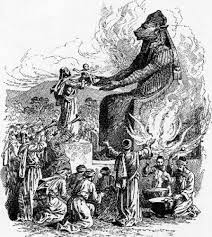 The Hebrew Bible was quite fierce in its denunciations of Molech, not simply because of the sin of idolatry but also because of the custom of the worshipers of Molech of sacrificing children to the god by fire. The Hebrew prophet Jeremiah describes with horror the ancient rites, telling us that God says, “They built high places to Baal in the Valley of Beth-hinnom and immolated their sons and daughters to Molech bringing sin upon Judah; this I never commanded them, nor did it enter my mind that they should practice such abominations. (Jeremiah 32:35)
The Hebrew Bible was quite fierce in its denunciations of Molech, not simply because of the sin of idolatry but also because of the custom of the worshipers of Molech of sacrificing children to the god by fire. The Hebrew prophet Jeremiah describes with horror the ancient rites, telling us that God says, “They built high places to Baal in the Valley of Beth-hinnom and immolated their sons and daughters to Molech bringing sin upon Judah; this I never commanded them, nor did it enter my mind that they should practice such abominations. (Jeremiah 32:35)
The Hebrew God reacted very strongly to this kind of worship. The Torah on several occasions commands the death penalty for anyone worshiping him. The text tells us that “Tell the Israelites, anyone, whether an Israelite or an alien residing in Israel, who gives any of his offspring to Molech shall be put to death. Let his fellow citizens stone him. I (God) myself will turn against such a man and cut him off from the body of his people; for in giving his offspring to Molech, he has defiled my sanctuary and profaned my holy name.” (Leviticus 20:2-3)
It must have been a terrifying and tempting thing to the peoples of antiquity when they saw the impressive temples of the pagan gods, the loud music, the professional priesthoods and their claims that such blood sacrifices and exotic fertility rites could make people’s lives better. The Hebrew God by comparison spent a lot of his career with a solitary ark drawn around in a cart. Later, He had but few holy places for sacrifice and in the days of Solomon these were concentrated into only one temple in Jerusalem. But the humble worship of the Hebrew God, who had no images, ritual tattoos and who rejected child sacrifice, survived. The images of Baal, Ashteroth and Molech are today viewed primarily by bored school children in museums.
For an unmarried man a woman to have casual sex after a party is very common today. What then about two men or two women having kinky sex or single men men masturbating regularly all their lives (with or without porn)? This seems to be the way many live these days, especially the younger gens.
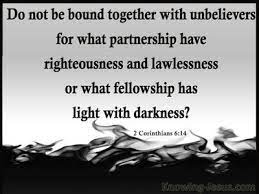 A related issue was in the Law of Moses: Jewish men were not to take non-Jewish wives. The book of Nehemiah closes with a summary of some drastic reforms undertaken by this venerable, godly man, after the walls of Jerusalem had been rebuilt in 445 BC.
A related issue was in the Law of Moses: Jewish men were not to take non-Jewish wives. The book of Nehemiah closes with a summary of some drastic reforms undertaken by this venerable, godly man, after the walls of Jerusalem had been rebuilt in 445 BC.
In those days also I saw Jews who had married women of Ashdod, Ammon, and Moab; and half of their children spoke the language of Ashdod, and they could not speak the language of Judah, but spoke the language of various peoples. And I contended with them and cursed them and beat some of them and pulled out their hair; and I made them take an oath in the name of God, saying, ‘You shall not give your daughters to their sons, or take their daughters for your sons or for yourselves. Did not King Solomon of Israel sin on account of such women? Among the many nations there was no king like him, and he was beloved by his God, and God made him king over all Israel; nevertheless, foreign women made even him to sin. Shall we then listen to you and do all this great evil and act treacherously against our God by marrying foreign women?’
And of Jehoiada, son of the high priest Eliashib, was the son-in-law of Sanballat the Horonite; I chased him away from me. Remember them, O my God, because they have defiled the priesthood, the covenant of the priests and the Levites." (Nehemiah 13:23-31)
This article is not written for the innocent, for underage children, for single men and women, for the divorced, widows, orphans, the homeless who know and are walking with Jesus. Most precious of all, though rare, are marriages and families functioning in ways pleasing to our God in these evil times where pressures are very high. May God affirm, protect, and safely deliver home all who trust Jesus--everyone young or old who is leaning on the everlasting arms.


The Dangers of Disqualification Doug Goins 1998
The Attitude that disqualifies Dave Roper 1995
Deliberate Sin
The Scars of Sin Ray Stedman
The Judgments of God
The Excluded Ones
Accountability
Pornography and the Church (Larry E. Ball)
Seasons of Stress in the World
The Body of Christ in Perilous Times
"Hard Times" Mavis Staples, (Stephen Foster)
"All the Good Times are Past and Gone" (Norman and Nancy Blake)
My Lord Knows the Way Through the Wilderness
version two
No Hiding Place Down Here (Carter Family)

![]()
Notes by Lambert Dolphin

